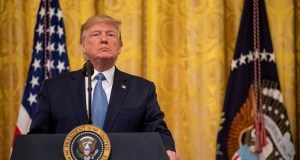ZTE ban, tucked inside the NDAA, passes the Senate

The $716 billion National Defense Authorization Act passed the U.S. Senate on Monday, including an amendment that would kill a deal the Trump administration made with China to effectively save telecommunications firm ZTE.
The bill still has a long way to go. The House of Representatives’ version, which omits the ZTE provision, has to be reconciled with the Senate version. Additionally, the White House strongly opposes the amendment.
Despite the process ahead, the amendment’s backers are taking the NDAA’s passage as a victory.
“We’re heartened that both parties made it clear that protecting American jobs and national security must come first when making deals with countries like China, which has a history of having little regard for either,” Sens. Marco Rubio, R-Fla., Tom Cotton, R-Ark., Chuck Schumer, D-N.Y., and Chris Van Hollen, D-Md., said in a statement. “It is vital that our colleagues in the House keep this bipartisan provision in the bill as it heads towards a conference.”
The White House deal saved ZTE from crippling sanctions. The agreement included a $1 billion fine while mandating new senior leadership and new U.S. compliance officers. That deal riled lawmakers from the beginning.
There are two reasons for the congressional animosity toward ZTE.
First, the company admittedly and repeatedly violated U.S. sanctions. Second, the company faces ongoing accusations that it is a national security threat to the United States due to its ill-defined relationship with the Chinese government. ZTE and Huawei have faced such accusations for nearly a decade.
Both companies deny the charges and many of the crucial details remain secret so the saga has far more questions than answers at this point.
“We know ZTE is a repeated and flagrant violator of U.S. laws,” Van Hollen said last month. “There’s absolutely no question of their culpability. Yet the President of the United States is fighting to protect jobs in China at a company that may be spying on Americans and has been sanctioned by our government. This is deeply troubling, regardless of your political party.”
The process of reconciling the Senate and House bills could take weeks in addition to the specter of an opposing White House looming large over the entire process.
While the Senate cracked down on ZTE, bipartisan election-security provisions did not make it into the defense bill.
With the midterm elections approaching, Sens. James Lankford, R-Okla., and Amy Klobuchar, D-Minn., lobbied unsuccessfully for language from their Secure Elections Act to be included. Their bill aimed to speed up the security-clearance process for state officials, giving more of them access to classified threat information. The Secure Elections Act also would have urged the Department of Homeland Security to quickly share election-related threats with all state election agencies.
“I’m disappointed that the NDAA did not include provisions from the Secure Elections Act.,” Lankford said in a statement to CyberScoop. “However, I will continue to work with my colleagues to have revised election security legislation enacted into law.”
After the U.S. intelligence community concluded that the Russian government meddled in the 2016 presidential election, U.S. officials have warned of renewed Russian information operations ahead of the midterms.
“As we get closer to the 2018 election, it’s irresponsible not to act on the Secure Elections Act to protect against interference from foreign entities,” Lankford said.
Sean Lyngaas contributed to this story.



